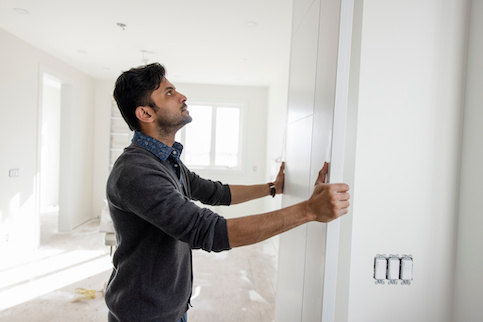Did you know that as a seller you can order an inspection for your home before you put it on the market? A pre-inspection can eliminate surprises before you launch into the home sale process.
Let’s take a look at what a pre-inspection is and walk through some details you should know before adding a pre-inspection to your to-do list.
What Is A Pre-Inspection?
Before putting your home on the market to sell the house, you can order a pre-inspection to learn about any potential issues with the home. You can use this information to get a jump-start on any repairs buyers may want resolved before purchasing your home. You can also include the report with your home listing to demonstrate the home’s value to potential buyers.
What Issues Can A Pre-Inspection Uncover?
Some examples of issues a pre-inspection may reveal include:
- Foundation issues
- Faulty wiring
- Roof deficiencies
- Inadequate attic ventilation or insulation
- HVAC system defects
- Plumbing problems
None of these issues are necessarily deal breakers, but knowing about them in advance may impact your approach to pricing and selling your home.
1. Hire A Professional Home Inspector
The first step is to hire a professional home inspector.
To find a reputable home inspector in your area, search on the American Society of Home Inspectors (ASHI) and the International Association of Certified Home Inspectors (InterNACHI) websites.
2. Determine The Scope Of The Inspection
The home inspector will run through a checklist of items to inspect in your home (like a standard home inspection). You can have the inspector check the entire home or limit their inspection to specific items or areas you have concerns about.
For example, if you’re concerned about flooding, you may want the inspector to focus more on basements and foundations than walls and interiors. If you recently had your home weatherproofed, you may want the inspector to focus on other areas of the home that have received less attention.
3. Decide What To Do After The Inspection
Once the pre-inspection is finished and you have the inspection report, you can decide whether to make the repairs. You may want to consult a real estate agent or REALTOR® to determine how potential issues may affect the sale.
Homeowners in certain states must sign a disclosure report acknowledging potential issues with the home, which makes buyers aware of these issues.
See What You Qualify For
Buy A Home
Discover mortgage options that fit your unique financial needs.

Refinance
Refinance your mortgage to have more money for what matters.
Tap Into Equity
Use your home’s equity and unlock cash to achieve your goals.
How Much Does A Pre-Inspection Cost?
A home inspection typically ranges from $280 to $400, but the total will depend on the costs in your area. If you live in a high-cost area, you may pay more. If you live in a lower-cost area, you may pay less.
What Are The Pros Of Getting A Pre-Inspection?
A pre-inspection offers various advantages. Let’s look at some benefits of getting one.
You’ll Know Of Any Issues Ahead Of Time
A pre-inspection lets you know about any issues with the home ahead of time. Let’s say you have cracks in the foundation you weren’t aware of. A pre-inspection can uncover the defect and possibly trigger some action from you before you sell. Knowing what needs fixing before you list can inform your conversations with your real estate agent. They can explain the potential impact any defects, issues or repairs may have on the home’s sale price.
You Can Start Making Repairs
One of the major benefits of a pre-inspection is that you can make repairs before you sell. If you know in advance that you need to replace the HVAC system or need a new roof, you can make those repairs or renovations, especially if a buyer will likely need to make them before moving in.
Buyers May Feel More Confident
Nobody, especially buyers, wants to learn about a major problem when the home is under contract.
Communicating to the buyer that you got a pre-inspection and already made some repairs can help buyers feel that the home will meet their expectations.
Gain An Advantage When Negotiating
By addressing any critical issues in the home before you reach the negotiation stage, buyers won’t have as much leverage if they try to negotiate the purchase price. If everything in the house is sound, you can potentially erase or reduce any problems the buyer may bring up from their inspection.
See What You Qualify For
You can get a real, customizable mortgage solution based on your unique financial situation.
What Are The Cons Of Getting A Pre-Inspection?
What about the cons of getting a pre-inspection? Let’s take a look at a few reasons you may want to keep a pre-inspection off your to-do list.
You Pay For It
A pre-inspection is for the seller’s information, so the seller must pay for the inspection. If you skip the pre-inspection, you can learn more about the condition of the home when a buyer pays to have your home inspected.
You May Need To Disclose Additional Issues
In many cases, sellers fill out a Seller’s Disclosure, also called a Seller’s Disclosure statement. The disclosure provides a buyer with information about any issues
Buyers May Still Order An Inspection
While home inspections offer vital information about a home’s condition, some buyers choose to skip it. If your buyer is using a government-backed loan – like a Federal Housing Administration (FHA) loan or a Department of Veteran Affairs (VA) mortgage – to purchase your home, their lender may require an inspection.
A buyer’s home inspection may uncover additional issues in the home an inspector didn’t find during the pre-inspection, and they may use the new information to negotiate a lower purchase price, request more repairs or walk away from the deal.
Should You Get A Pre-Inspection Before Listing Your Home?
There’s no right or wrong answer. However, it’s a good idea to carefully consider the pros and cons of getting a pre-inspection before listing your home. Consider asking a real estate agent for their opinion to help you make an informed decision.
The Bottom Line
There are several reasons to order a pre-inspection, including that you’ll know about any issues ahead of time and can make repairs. Buyers may also feel more confident about the home and have less wiggle room to renegotiate the home price – both major benefits for a seller!
But there are potential downsides, including the cost of the pre-inspection and buyers potentially using defects or issues to request more concessions.
Find A Mortgage Today and Lock In Your Rate!
Get matched with a lender that will work for your financial situation.

Melissa Brock
Melissa Brock is a freelance writer and editor who writes about higher education, trading, investing, personal finance, cryptocurrency, mortgages and insurance. Melissa also writes SEO-driven blog copy for independent educational consultants and runs her website, College Money Tips, to help families navigate the college journey. She spent 12 years in the admission office at her alma mater.












